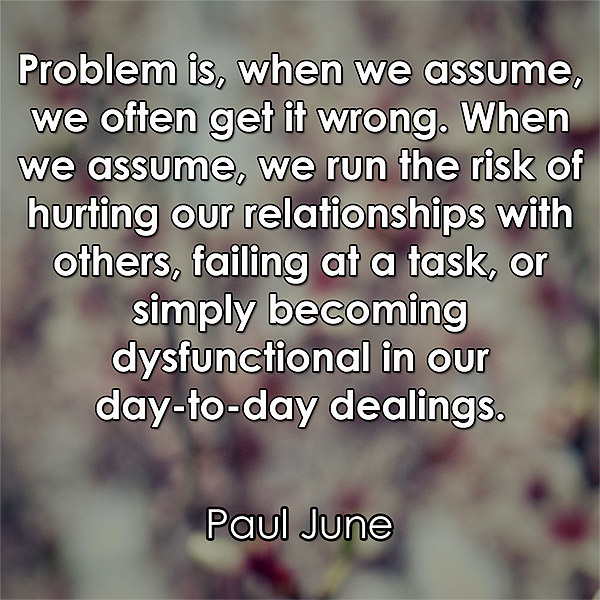We’re all guilty of assuming. After all, assumptions based on life experiences and common sense can help us to anticipate and be proactive, rather than reactive.
But taking things for granted all of the time, even when we should know better, is where we can get into trouble . . . and the news these days—and how many of us react to the news—seems full of assumptions.
We assume our leaders have all the answers—from fixing the economy and getting a handle on immigration, to waging battles against Ebola and ISIS—but clearly, no one has all the answers. We assume doctors and medicine can fix anything that ails us, or that we can create any new technology we need to make our lives more efficient, or that we can solve all the problems life throws our way.
We should not assume there will always be answers, because, quite frankly, the questions have gotten pretty big and sometimes we don’t even know the question. Life is not a tidy sitcom or TV-drama where issues are resolved in 30- or 60-minutes chunks—where we can “assume” the hero or our favorite characters will triumph or catch the bad person.
In a blog I wrote last year, I stated, “When we get comfortable with a situation (or even apathetic), we can get complacent or ‘lazy’ or indifferent . . . When we assume, we run the risk of hurting our relationships with others, failing at a task, or simply becoming dysfunctional in our day-to-day dealings.”
Now is NOT the time for us to assume anything, or to allow others to take us for granted. Get informed, maximize understanding, and communicate clearly and with transparency.
Here’s that blog again, in its entirety. Enjoy!
Assume at Your Own Risk
(Originally posted on May 9, 2013)
Don’t Assume. How many times have we heard someone tell us that, whether it’s at home or on the job? There’s usually a second part to that saying, something about “When you assume, you make a (posterior section) out of you and me.”
Seems like sound advice to me.
To “assume” means to take something for granted without proof. I think we assume because it requires less brainpower for us to assume something versus actually having to go out and substantiate it.
To illustrate, remember those “proofs” in trigonometry class? It was always much easier to look at an object and declare it a triangle or rectangle or whatever, than it was to go through the step-by-step process of actually proving it. Life can be a lot like that. When we’re faced with a particular situation, whether it’s at home or on the job, with a co-worker or a loved one, it’s just easier to “assume” the circumstances, motivations, and likely outcomes of the situation based on life experiences. Why bother go through the trouble of fully understanding a situation, when we can just assume (there’s only so much time in the day, right)?
Problem is, when we assume, we often get it wrong. When we assume, we run the risk of hurting our relationships with others, failing at a task, or simply becoming dysfunctional in our day-to-day dealings.
I’m not suggesting we go to the extremes of not assuming the sun will come up tomorrow, or not assuming that the bridge over the bay that was there yesterday will be there tomorrow, or that the laws of physics that govern our Universe will suddenly go awry. I am suggesting that in those situations where clear understanding and clear communication is critical, that we NEVER assume anything.
- Do you need to get certain results from an employee or team at work? Don’t assume he or she (or the entire team) shares your vision or understanding of a particular requirement. Communicate what you want done and by when clearly. Ask questions to ensure that you have been heard and understood.
- Do you always assume the worst from a given situation? Why? What does experience tell you? Have you ever assumed the worst and gotten the worst? For example, do you fret over running out of money? Have you everrun out of money? While the worst sometimes can happen, chances are the outcomes of most situations will never be the worst possible, and all you’ve done is spent a ton of mental and emotional capital worrying unnecessarily. Don’t assume. Rather, look at the situation objectively and reach conclusions based on facts and likely scenarios.
- Similarly, don’t assume all is fine. Relationships with friends, spouses, and even business colleagues require constant reinforcement. Take nothing for granted. You can’t just toss seed onto the ground and hope it grows into something bountiful. Likewise, relationships need to be cultivated and nurtured so they grow.
- Do you assume your child knows and remembers all of the household rules, such as curfews, the “do”s and “don’t”s of when friends can (or can’t) come over, chores, and expectations around homework and studying? Again, don’t assume. Make sure your child knows what you expect. Don’t nag, but also don’t be afraid to remind him or her of the rules. Youngsters typically aren’t focused on the house rules, not with texts, Facebook, friends, and their studies to distract them, but they do need their boundaries.
- Don’t assume your elected representatives at the local, state, or Federal level know how you think or feel about issues. You might be surprised (or not) at how “out of touch” with constituents our officials can sometimes become (sadly, it’s the nature of the beast). So don’t be afraid to contact their offices and tell them how you feel. At the same time, don’t assume your voice doesn’t matter. Sometimes all it takes is a phone call or email to get an official thinking the same way as you.
- Don’t assume good health, especially as you get older. This, perhaps, is the most important assumption to overcome. Our bodies, minds, and spirits require constant replenishment, even when we look and feel our best. Get enough sleep, eat right, exercise, and don’t forget to build a little “down time” into your busy schedule. Fun is important, not optional.
When we get comfortable with a situation (or even apathetic), we can get complacent or “lazy” or indifferent. We begin to think that because a certain thing has always been a certain way, it will remain that way; we begin to accept that because a relationship with someone has always been a certain way, the relationship will remain that way as well.
Don’t assume, not if it’s important to you, your job, a friend, or a loved one. Take the time NOT to take something for granted. Make sure you understand a situation fully and then act if/as necessary. The only thing you can assume is that when you assume all of the time, it will eventually cost you.
How has “assuming” cost you? Share your experiences here.

